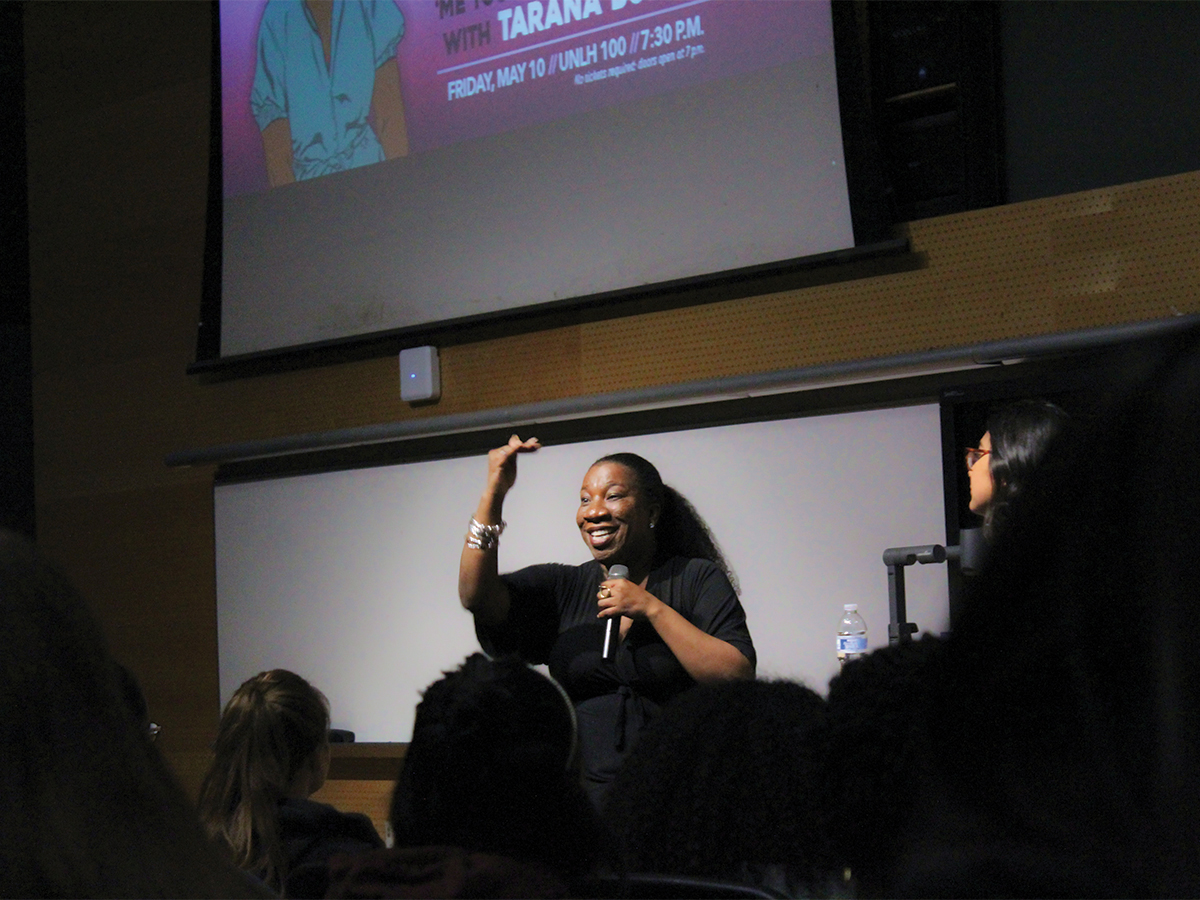
On Friday, May 10, UNLH 1000 was packed with students, faculty, staff and community members. “‘me too.’ A Conversation with Tarana Burke” was a collaboration between CARE, Women’s Resource Center, LGBT Resource Center, Middle Eastern Student Center, African Student Programs, Native American Student Programs, Center for Ideas and Society, ASPB, the Referendum Student Advisory Committee (RSAC) and the Chancellor’s office. The event began at 7:30 p.m. and was moderated by CARE director Karla Aguilar.
Burke, a civil rights activist, founded the #MeToo movement in 2006. Burke became involved with activism at the age of 14 through an organization that taught grassroots community organizing to young people. UCR marked Burke’s 100th speaking engagement at a university within a year and a half.
Burke cited Maya Angelou as her inspiration and discussed the fascination she felt when she read “I Know Why the Caged Birds Sing” at 11 years old. “It was the first time I read or heard or experienced anybody else who experienced sexual abuse,” Burke said. The fascination continued when Burke in 11th grade saw a recording of Angelou reciting “Phenomenal Woman.” Angelou became Burke’s inspiration for how to combine one’s public life with their work.
Burke recalled the origin of the phrase “me too” and the situation that led to it. When Burke was 22 years old, a young girl disclosed her status as a survivor to Burke. “I didn’t know how to respond, how to support,” Burke began. “I wanted to say something deep and profound … I wanted to tell her this happened to me too.”
Almost two years later, the conversation on sexual violence is still relevant and has garnered international dialogue. Burke remembered when she used to speak about the topic at churches and had to beg to have it included in social justice discussions. “People ask me all the time if I was surprised when #MeToo went viral, and I’m not at all. I’m surprised that we still talk about it,” Burke commented.
Burke also discussed some of the misconceptions about the movement that were mostly caused by Hollywood’s portrayal of it. Burke stated how even Alyssa Milano’s tweet, which popularized the movement in 2017, called anyone who experienced sexual violence to say “me too” instead of naming their accuser. “This movement is not (about) naming people,” Burke agreed.
According to Burke, the discussion surrounding the topic should be about unchecked accumulation of power and about dismantling the systems that perpetuate sexual violence. Burke then went on to state how the movement is not just for women. According to the National Sexual Violence Resource Center, “one in four girls and one in six boys will be sexually abused before they turn 18 years old.” Burke explained, “There (are) so many male survivors. There (are) so many survivors who don’t identify as either. To call it a women’s movement, it leaves a lot of people out.”
Before the Q&A component, the event closed by discussing the steps young people can take to end sexual violence. Burke discussed how young people need to be ambassadors for the movement and organize. Burke encouraged people to discuss the movement openly and differently from how it had been discussed in the past in order to expand on its vision. According to Burke, colleges are spaces where young people can learn and fail safely. With organizing, Burke does not mean to join an organization but for people to come together on an issue, plan a strategy to address the issue and delegate people to work within that strategy, “Organizing doesn’t have to be a protest. It doesn’t have to be a march,” Burke explained. “It can be something very different. Be different.”
Upcoming ASPB events include the May 16 advanced screening of the film “Good Boys” and the recurring Spring Nooners concerts series on Wednesdays.







